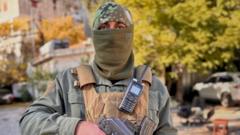In the dim light of a late afternoon, Noor, an Alawite woman, trembles in fear while recounting a grim incident to the authorities of Hayat Tahrir al-Sham (HTS), the newly established power in her hometown of Latakia, Syria. This city, a cradle of Alawite identity, finds itself amidst a precarious transition, as various rebel forces vie for influence in the wake of Assad’s retreat. Noor’s plight is emblematic of the widespread anxiety felt by many fellow Alawites, who find themselves caught between a reformed authority and their complicated past.
Three days ago, armed men forcibly entered Noor’s home, seizing her space and belongings in front of her family. HTS, which has proclaimed itself the enforcer of a new order, strives to assert authority over the chaos that ensued following the regime change. Yet, for Noor and her community, this is not just a change in political rulers—it's an existential crisis brought on by the fear of violent retribution for previous allegiances to Assad’s regime.
The Alawite community, already wary due to being a minority comprising about 10% of the populace, confronts the unsettling reality that their protection was once assured by the regime that they now fear may lead to their downfall. Noor, pleading her case and sharing CCTV evidence, encounters the HTS general security commander, Abu Ayoub, who commands mixed sentiments from his constituents. Many Alawites remain hesitant to celebrate this new era, recalling previous warnings of potential persecution.
The former military intelligence building, now repurposed by HTS for public grievances, stood both as a notorious symbol of oppression and a bastion of hope for resolution. However, the street-level encounters reveal a community rife with conflict and disenfranchisement—a man with visible injuries waits to report thuggish behavior from a rival rebel faction, reflecting a daily struggle for peace and justice amidst ongoing lawlessness.
Despite HTS's stated intentions to unify all sects and ensure peace, residents can’t shake their apprehension, staring warily from their windows at armed men enforcing the law where once a tyrannical regime asserted its ruthless control. Even celebrations of newfound freedom provide scant comfort as armed groups continue to scour neighborhoods for order amidst social chaos.
As the convoy arrives at Noor’s former residence, the appearance of HTS is met with a mix of trepidation and relief. Noor prepares to reclaim some of her belongings but struggles with the realization that her sense of home is irrevocably shattered. Holding on to fragments of her previous life and clinging to a faint glimmer of hope, her future remains uncertain in a landscape marked by fear, memories of oppression, and the longing for security in a profoundly changed Syria.
Three days ago, armed men forcibly entered Noor’s home, seizing her space and belongings in front of her family. HTS, which has proclaimed itself the enforcer of a new order, strives to assert authority over the chaos that ensued following the regime change. Yet, for Noor and her community, this is not just a change in political rulers—it's an existential crisis brought on by the fear of violent retribution for previous allegiances to Assad’s regime.
The Alawite community, already wary due to being a minority comprising about 10% of the populace, confronts the unsettling reality that their protection was once assured by the regime that they now fear may lead to their downfall. Noor, pleading her case and sharing CCTV evidence, encounters the HTS general security commander, Abu Ayoub, who commands mixed sentiments from his constituents. Many Alawites remain hesitant to celebrate this new era, recalling previous warnings of potential persecution.
The former military intelligence building, now repurposed by HTS for public grievances, stood both as a notorious symbol of oppression and a bastion of hope for resolution. However, the street-level encounters reveal a community rife with conflict and disenfranchisement—a man with visible injuries waits to report thuggish behavior from a rival rebel faction, reflecting a daily struggle for peace and justice amidst ongoing lawlessness.
Despite HTS's stated intentions to unify all sects and ensure peace, residents can’t shake their apprehension, staring warily from their windows at armed men enforcing the law where once a tyrannical regime asserted its ruthless control. Even celebrations of newfound freedom provide scant comfort as armed groups continue to scour neighborhoods for order amidst social chaos.
As the convoy arrives at Noor’s former residence, the appearance of HTS is met with a mix of trepidation and relief. Noor prepares to reclaim some of her belongings but struggles with the realization that her sense of home is irrevocably shattered. Holding on to fragments of her previous life and clinging to a faint glimmer of hope, her future remains uncertain in a landscape marked by fear, memories of oppression, and the longing for security in a profoundly changed Syria.















